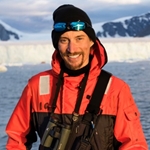
James Hyde
Pacific Northwest born James Hyde grew up immersed in the Salish Sea, on Vashon Island with Seattle as his backdrop. A passionate traveler from a young age, James explored four continents before finishing his degree at Western Washington University's Huxley College of the Environment. A transformative visit to Australia's Great Barrier Reef sparked his fascination with marine life, particularly underwater ecology and scuba diving. This passion led him to a Seattle dive shop, and a local independent middle school where he shared his love for the ocean with the students and assisted with the Travel Study program, thus beginning his journey toward expedition travel.
In 2016, a childhood friend introduced James to Lindblad Expeditions, where he began as a Dive Buddy. Over the years, he expanded his role across the fleet, learning from each environment and the diverse ecosystems the ships explored. Eventually, he became an Undersea Specialist, a role that deepened his love for the ocean and his commitment to conservation. James is passionate about inspiring others to care for the unique ecosystems thriving in protected waters and advancing Lindblad's contributions to scientific research. Whether it's monitoring ocean plastics or engaging in citizen science projects, James is dedicated to furthering marine conservation efforts in partnership with leading universities and research institutes worldwide.
My upcoming expeditions
Antarctica, South Georgia and the Falklands
Antarctica Direct: Sail and Fly the Drake Passage
Antarctica Direct: Fly the Drake Passage 8-Day
Antarctica Direct: Fly the Drake Passage
Antarctica and Patagonia: Legendary Ice and Epic Fjords
Islands of the Azores: Basalt Peaks to Volcanic Vineyards
Svalbard: In Search of Iconic Arctic Wildlife
